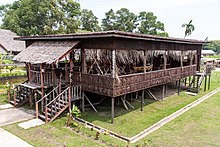Murut
The Murut are an indigenous people of the Malaysian state of Sabah . They live in the interior of northern Borneo , particularly in the districts of Keningau , Tenom and Nabawan Pensiangan , along the Sapulut and Padas rivers . Murut can be translated as a mountain people .
The Murut are divided into two subgroups, the Tagol (lowlands) and Timugon (highlands). They speak Murut languages, which belong to the Austronesian language family . The Tagol Murut serves as the common lingua franca .
Way of life
The Murut were the last of Sabah's peoples to give up headhunting . Similar to the Iban in Sarawak , collecting the heads of the enemies played a large role in the animistic belief of the Murut. For example, a man could only get married if he could show the family of his future wife at least one head.
The Murut run slash and burn and grow mountain rice and tapioca . They supplement their diet with blowpipe hunting and occasional fishing. They live in communal longhouses , usually near a river that they use as a transport artery. Many have adopted a fundamentalist Christianity , which has resulted in some losses in their customs.
The traditional clothing of the men consists of a jacket made from the bark of the breadfruit tree ( Artocarpus tamaran ), a red loincloth and a headdress decorated with the feathers of an Argus pheasant ( Argusianus argus ). The women wear a black sleeveless blouse and a sarong that goes below their knees. Like most other indigenous peoples of Sabah, the Murut adorn their clothing with pearl jewelry patterns and make belts from silver coins. Another type of belt, made of reddish brown glass beads and yellow and blue beads, is worn loosely around the waist.
The Murut wedding celebrations can last several days. Ancient Chinese vases or jugs occupy an important place in their customs. Vases are also considered to be the place of ghosts and larger ones were previously used as coffins.
Murut in Sarawak
The term Murut is sometimes also used for a different ethnic group of Borneo, namely mainly in Sarawak living Lun Bawang . However, since these have nothing in common culturally and historically with the Murut from Sabah, there has been an increasing trend in the recent past to no longer use the term for them, but only to designate them as Lun Bawang. Nevertheless, this occasionally causes confusion.
Individual evidence
- ↑ Sarawak Tribune, Time for Bidayuhs to have own identity, says Manyin ( Memento of February 5, 2012 in the Internet Archive ), May 9, 2002.
